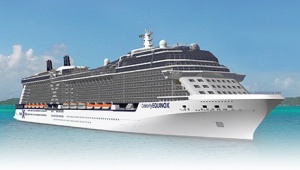Celebrity Cruises ship joins University of Miami ‘OceanScope’ programme

During Celebrity Cruises’ Celebrity Equinox recent scheduled dry dock in Cadiz (Spain), the ship joined Royal Caribbean International’s Allure of the Seas and Explorer of the Seas in a programme that tracks ocean circulation dynamics and measures atmospheric and oceanographic conditions, on repeated journeys.
Traditionally known for its innovative design, high-quality service and award-winning cuisine, Royal Caribbean Cruises Ltd. also works closely with the University of Miami’s Rosenstiel School of Marine and Atmospheric Science with scientific research conducted on several ships. The scientists capture and analyse oceanographic and atmospheric data on the vessels sailing worldwide.
The scientists record ocean temperature, salinity and chlorophyll concentration, as well as properties of the ocean’s surface, such as reflectance and absorbance. In addition, they measure meteorological properties, such as wind speed, wind direction, barometric pressure and humidity. This data helps scientists monitor, understand, and forecast climate change and its effects on marine ecosystems, such as coral reefs.
Rich Pruitt, vice president, safety and environmental stewardship, Royal Caribbean Cruises Ltd. commented:
“Royal Caribbean Cruises Ltd. is extremely proud of the collaboration with the OceanScope programme, helping us to greater understand the global climate system and the oceans on which our ships sail. Our business depends on ocean health and part of protecting ocean health is understanding the atmosphere and its effects.”
ADVERTISEMENT
Dr. Peter B Ortner, director of the Cooperative Institute for Marine and Atmospheric Studies at the University of Miami Rosential School of Marine and Atmospheric Science added:
“The data is proving to be of invaluable assistance in calibrating and verifying the American and European satellites monitoring climate change throughout the ocean. Smaller packets of data are transmitted on an hourly basis through RCCL’s regular satellite link and large data sets will be sent back via Internet connection when the ship is in port.”
Funded in part by RCL’s Ocean Fund, The University of Miami’s OceanScope equipment on Explorer of the Seas has tracked ocean circulation dynamics since 2000, in the North Atlantic basin that the ship sails through while on Bermuda and Caribbean routes from the north east of the USA. The Allure of the Seas lab tracks these conditions through the eastern and western Caribbean, and has done so since 2012. The installation of an OceanScope lab on Celebrity Equinox will provide insight into the ocean dynamics in the Mediterranean Sea, across the North Atlantic and along the Iberian Peninsula.
RCL created The Ocean Fund in 1996, to support marine conservation organisations in safeguarding the health of the world’s oceans and coastal communities. The Fund aims to support efforts to restore and maintain a healthy marine environment, minimise the impact of human activity on the environment, and promote awareness of ocean and coastal issues and respect for marine life. Since The Ocean Fund’s establishment, RCL has given over $13 million to over 75 organisations around the world for projects that relate to ocean science, climate change, key marine species, education and innovative technologies.

